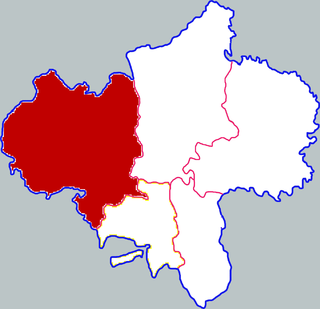This page is based on this
Wikipedia article Text is available under the
CC BY-SA 4.0 license; additional terms may apply.
Images, videos and audio are available under their respective licenses.
The politics of Liaoning Province in the People's Republic of China is structured in a single party-government system like all other governing institutions in mainland China.

Wang Zhaoguo is a retired Chinese politician who came to prominence during the era of Deng Xiaoping. An automobile factory technician by trade, Wang had a long and varied political career, known for having acquired a ministerial-level position at the age of 41. He successively served as the First Secretary of the Communist Youth League, the chief of the party's General Office, Secretary of the Central Secretariat, Governor of Fujian, Head of the United Front Work Department and Vice-Chairman of the CPPCC.
The politics of Jilin Province in the People's Republic of China is structured in a dual party-government system like all other governing institutions in mainland China.
Wang Gang is a retired Chinese politician. He served in prominent leadership positions in the Communist Party of China after 1999, including Director of the General Office of the Communist Party of China and Secretary of the Secretariat. He was a member of the Politburo from 2007 to 2012.

Wang Dongming is a Chinese politician who has served since 2018 as the Vice Chairperson of the Standing Committee of the National People's Congress and the Chairman of the All-China Federation of Trade Unions. Originally from Liaoning province, Wang served as the chief of the General Office of the Central Institutional Organization Commission between 2007 and 2012, and the Communist Party Secretary of Sichuan province between 2012 and 2018.
Wang Guosheng is a Chinese politician and senior regional official, currently serving as the Communist Party Secretary of Henan province. Previously, he served as Governor of Hubei province, and the Communist Party Secretary of Qinghai province.
Wang Rulin is a Chinese politician and senior regional official. He is serving as Vice-Chairperson of the National People's Congress Agriculture and Rural Affairs Committee. From 2014 to 2016, Wang was the Communist Party Secretary of Shanxi province, where he managed anti-corruption efforts as part of the greater anti-corruption campaign under Xi Jinping. Wang formerly served as Party Secretary (2012–14) and Governor (2009–12) of Jilin province.
Wang Xiankui is a Chinese politician best known for his terms as Governor, then Communist Party Secretary of Heilongjiang, a province in the northeast part of the country. Wang worked in various capacities in the railway system before entering politics in 2003 as the deputy party chief of Gansu province.
Wang Xuejun is a Chinese politician and former senior regional official. He served as the Governor of Anhui from 2013 to 2015, then was promoted to Communist Party Secretary of Anhui, a position he held from 2015 to 2016.
Wang Maoshe is a former Chinese politician who served as the Communist Party Secretary of Yuncheng, a city in Shanxi province, between 2013 and 2014, and prior to that, party chief of Shuozhou. He was investigated for corruption and was expelled from the Communist Party of China in 2015.

Wang Renzhong was a Chinese political leader. He was born to a peasant family in Jing County, Hebei. In November 1933, he joined the Communist Party of China. From 1938, he served as the vice director of Hebei-Shandong-Henan CPC Publicity Department, director of South Hebei CPC Propaganda Department, and as a party group secretary. After 1945, he became the director of South Hebei CPC Administrative Office.
Li Xi is a Chinese politician. He is a member of the Politburo of the Communist Party of China and the current Communist Party Secretary of Guangdong province. Li spent much of his career in northwestern China, and served as the party chief of the revolutionary base of Yan'an. He then served as the deputy party chief of Shanghai, then Governor of Liaoning province, then promoted to party secretary.
Wang Jianguo is a former Chinese politician who spent most of his career in North China's Shanxi province. As of December 2014 he was under investigation by the Communist Party's anti-corruption agency. Previously he served as the Mayor of Xiaoyi.
Wang Dongfeng is a Chinese politician and current Communist Party Secretary of Hebei province. He was formerly the Mayor of Tianjin, one of the four direct-controlled municipalities of China. Born in Xi'an, Wang spent his early career in his home province of Shaanxi. He then served in the State Administration for Industry and Commerce before being transferred to Tianjin.
Wang Wentao is a Chinese politician who has been Governor of Heilongjiang province since March 2018. He formerly served as Communist Party Secretary of Jinan and Deputy Party Secretary of Shandong province.
Wang Feng original surname Wang, was a People's Republic of China politician, born in Shaanxi Province. He was Communist Party of China Committee Secretary of Gansu, twice Communist Party of China Committee Secretary of Ningxia and Communist Party of China Committee Secretary and Chairmen of Xinjiang (1978).
Wang Jianjun is a Chinese provincial politician, currently serving as the CPC Secretary of Qinghai Province.
Wang Yang is a former Chinese politician. He held a series of positions in governments at the municipal and provincial level in northeast China's Liaoning province for more than 30 years. He was investigated by the Communist Party of China's anti-graft agency in March 2016. At the time of his downfall, he was serving as vice-chairman of the Liaoning People's Congress.





